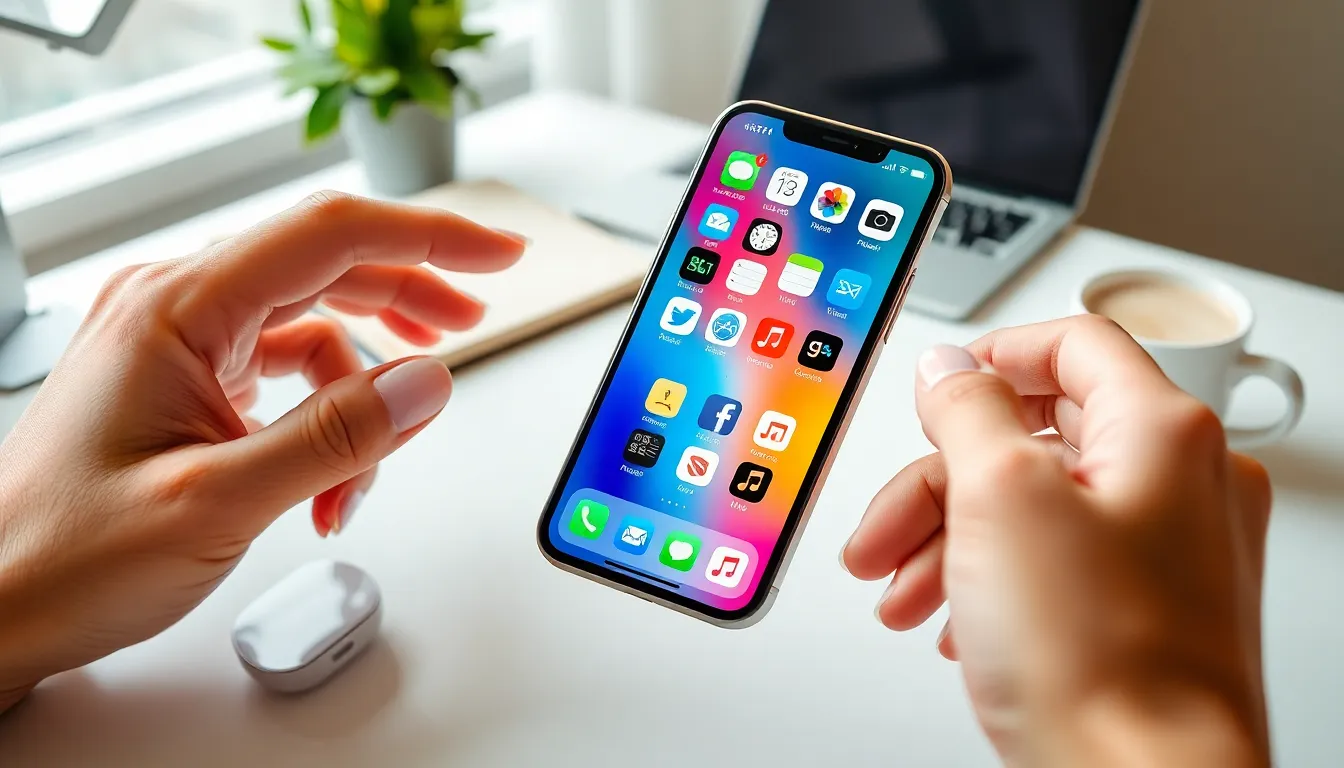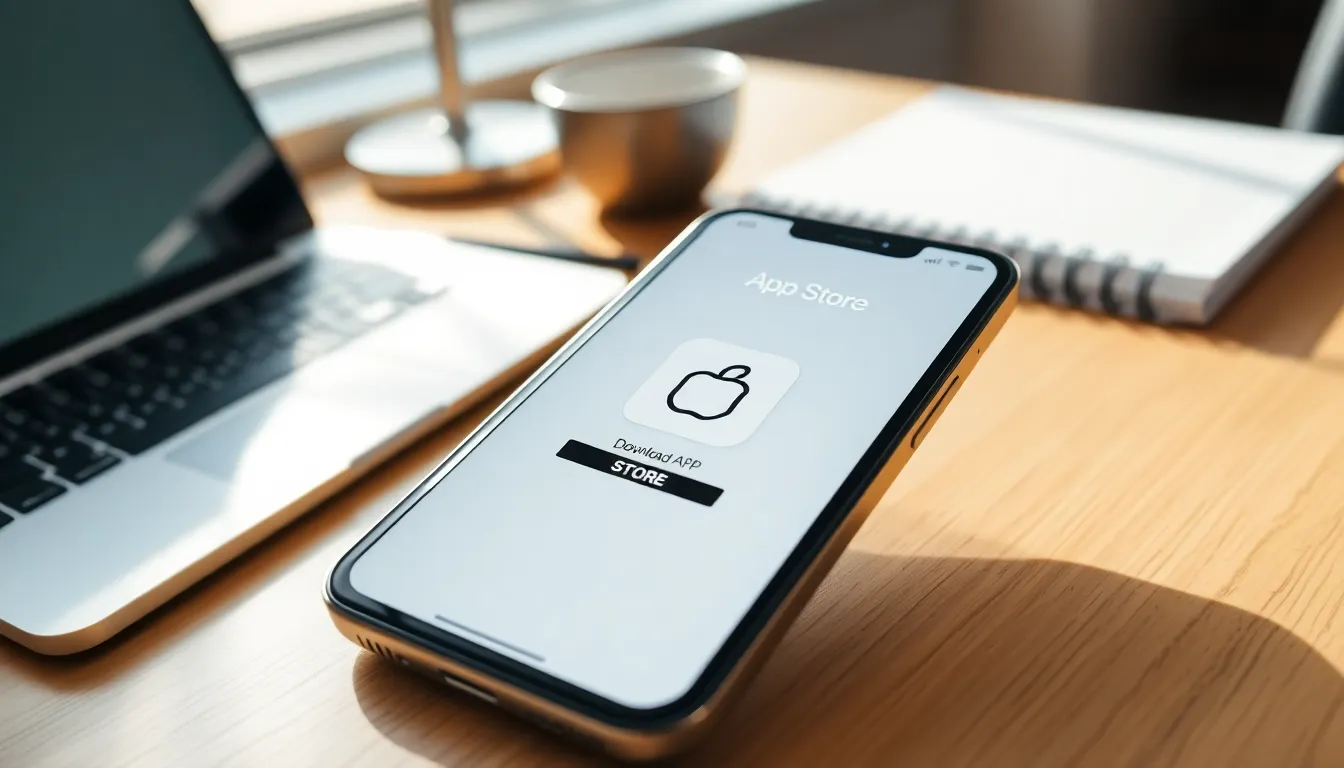In a world buzzing with notifications and deadlines, finding a moment of peace can feel like searching for a unicorn. Enter mindfulness apps, the modern-day magic wands that promise to sprinkle a little zen into the chaos of daily life. With just a few taps, users can transform their frantic minds into serene sanctuaries, all while dodging the guilt of skipping that gym session.
These apps aren’t just for yogis in lotus poses; they’re for everyone navigating the rollercoaster of modern living. Whether it’s a quick five-minute meditation or a deep dive into breathing techniques, mindfulness apps offer a treasure trove of tools to help anyone reclaim their calm. So why not trade in some of that scrolling for a bit of soul-searching? After all, who wouldn’t want to be the calm in the storm—preferably while lounging on the couch with a cup of tea?
Table of Contents
ToggleOverview of Mindfulness Apps
Mindfulness apps offer users accessible tools for managing stress and enhancing mental well-being. Popular features include guided meditations, breathing exercises, and sleep aids. Many individuals use these resources to incorporate mindfulness practices into their daily routines without requiring extensive time commitments.
Studies indicate that regular use of mindfulness apps leads to improved emotional regulation and decreased anxiety. For instance, apps are designed for various skill levels, making them suitable for beginners and experienced practitioners alike. Many users report that even short sessions significantly impact their mood and focus throughout the day.
Additionally, personalization in mindfulness apps caters to individual preferences. Some users may choose specific meditation lengths, while others might select themes that resonate with their personal experiences. Other features, such as reminders and progress tracking, encourage consistent practice and help users stay committed to their mindfulness journeys.
Research from the University of Massachusetts shows that mindfulness apps can result in noticeable reductions in stress levels after just a few weeks of use. Specific activities, such as mindful breathing and visualization exercises, support users in self-regulation, enhancing their ability to cope with daily challenges.
Wide-ranging options exist in the marketplace, providing different approaches to mindfulness. Popular apps include Calm, Headspace, and Insight Timer, each offering unique features and content libraries. Adoption of one or more of these apps can lead to an enhanced overall sense of well-being and mindfulness in everyday life.
Popular Mindfulness Apps

Mindfulness apps have gained traction as essential tools for stress relief and well-being. Various applications offer unique features designed to improve users’ mindfulness practices.
App Features
Calm provides a library of guided meditations and sleep stories. Headspace offers a structured curriculum, focusing on specific themes. Insight Timer specializes in community support, allowing users to connect with fellow meditators. Breathing exercises are available across these platforms, helping individuals manage anxiety in real time. Customization options, such as selecting session lengths and themes, cater to personal preferences. Daily reminders encourage consistency in practice, reinforcing healthy habits.
User Experience
Users generally find these apps easy to navigate. Calm’s serene design makes accessing resources enjoyable. Headspace utilizes vibrant visuals to guide users through their sessions. Insight Timer encourages community interaction, enriching the experience with shared insights. Regular updates ensure content remains fresh and relevant, enhancing overall satisfaction. Feedback from users often highlights improvements in focus and emotional regulation, showcasing the effectiveness of these digital tools in daily life.
Benefits of Using Mindfulness Apps
Mindfulness apps offer various advantages that support mental well-being. They serve as valuable tools for enhancing everyday life through focused practices.
Stress Reduction
Using mindfulness apps consistently can significantly lower stress levels. Research from the University of Massachusetts indicates noticeable stress reduction occurs within weeks of starting a mindfulness practice. Short, guided meditations or calming breathing exercises promote immediate relaxation and help users handle daily pressures effectively. These apps create a convenient way to integrate mindfulness into busy schedules. Users report feeling more in control and less overwhelmed after engaging with stress-relief exercises. App features like timed sessions and soothing sounds empower individuals to tailor their experiences, making stress reduction more accessible than ever.
Improved Focus
Mindfulness apps can enhance concentration and clarity over time. Engaging in short, structured mindfulness practices leads to heightened awareness and better cognitive function. Studies reveal that even brief meditation sessions help individuals refocus during the day, improving productivity at work or school. Features like daily reminders prompt users to take mindful breaks, seamlessly incorporating focus-enhancing exercises into routines. People generally notice their ability to concentrate on tasks improving, especially after consistently using these apps. This shift towards increased focus contributes to overall mental flexibility and a calmer mind.
Limitations of Mindfulness Apps
Mindfulness apps offer valuable resources, but they come with certain limitations that users should consider.
Accessibility Issues
Not everyone has access to mindfulness apps due to technological barriers. Individuals in underserved communities may find it challenging to download or use these applications without reliable internet. Furthermore, some apps require subscriptions or in-app purchases, making them less accessible to those on tight budgets. Language barriers also present a challenge; many apps primarily cater to English-speaking users, limiting access for non-English speakers. Additionally, users with disabilities may find navigation difficult if apps lack proper accessibility features, making it essential for developers to prioritize inclusivity in their designs.
Effectiveness Concerns
Effectiveness varies among users, as not all experience the same level of benefit from mindfulness apps. Some studies suggest that while many users report reduced stress, inconsistent use can hinder results. Variability in personal engagement with the content plays a significant role; those who don’t find specific techniques appealing might not achieve desired outcomes. Additionally, reliance solely on apps may prevent users from exploring other therapeutic practices, reducing the overall effectiveness of mindfulness training. Long-term benefits often require patients to engage in broader mindfulness techniques outside of app usage.
Future Trends in Mindfulness Apps
Emerging trends indicate that mindfulness apps will continue to evolve, incorporating advanced technologies. Artificial intelligence is set to personalize user experiences by analyzing habits and preferences. Users can expect adaptive features that suggest tailored meditations and exercises.
Integration with wearable technology is on the rise. Smartwatches and fitness trackers can now sync with apps, enabling users to monitor heart rates and stress levels while practicing mindfulness. This feature enhances the ability to engage when stress peaks.
Gamification is likely to make mindfulness practices more appealing. By incorporating elements like points, badges, and challenges, apps can motivate users to maintain consistency in their routines. Fun experiences promote long-term commitment, making mindfulness a daily habit.
Community engagement is another focus area. Mindfulness apps may build more interactive platforms, allowing users to participate in group meditations or share experiences with others. This connection fosters a support network that can enhance motivation and accountability.
Focus on mental health awareness will also shape future developments. Mindfulness apps can expand offerings to include features that address specific mental health challenges. Inclusion of resources for anxiety, depression, and stress management supports users’ diverse needs.
User feedback will play a significant role in app enhancements. Regular updates based on customer input ensure that the apps meet evolving expectations. Spending time on community forums enables developers to understand better what users want, leading to continuous improvement.
Accessibility remains a crucial consideration. Developers might focus on reducing barriers, making mindfulness practices available to a larger audience. Simple design choices and multilingual support can help bridge gaps for underserved communities.
As technology advances, the effectiveness of mindfulness apps is likely to improve. Regular use has shown positive outcomes, with studies highlighting enhanced focus and emotional regulation. The ongoing integration of innovative features will support users on their mindfulness journeys.
Mindfulness apps are becoming essential tools for anyone seeking to enhance their mental well-being. They offer accessible solutions for managing stress and improving focus in a fast-paced world. With features designed to fit various lifestyles and preferences, these apps make it easier than ever to incorporate mindfulness into daily routines.
As technology continues to evolve, the future of mindfulness apps looks promising. Innovations like AI personalization and community engagement will likely enhance user experiences. While they may not replace traditional practices entirely, these apps serve as valuable resources for those looking to cultivate a more mindful life. Embracing these digital tools can empower individuals to prioritize their mental health and navigate everyday challenges with greater ease.







